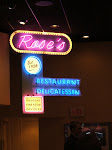This paper deals with the fate of eight pseudopatients who had themselves admitted to psychiatric institutions in the early 1970s. The psuedopatients (many of who were involved in the profession of psychiatry or psychology) were thus labelled a specific way upon entry and their behavior (which was "normal" following their admittance) was interpreted with that category in mind. For example, the pseudopatients took a lot of notes during their time at the various facilities and this was commented on by the staff as an indication of their insanity! So the question becomes can we tell the sane from the insane? Apparently the field of psychiatry couldn't in 1973.
Whether a paper this old (it was published in 1973) reflects the current state of psychiatry, etc. I can't say. I do wonder whether a similar experiment produced today would bring about the same result? I think that it is likely that it would. Anyone have any evidence for a conclusion opposite this one?
Subscribe to:
Post Comments (Atom)


4 comments:
Haven't read the paper you linked to yet (hopefully will get a chance to), but I find this theme fascinating (that is, what is or isn't insane, and how do you determine that?). There are some great movies that deal with this idea. The obvious one being One Flew Over the Cuckoo's Nest (based on the book), and then a recent favorite of mine, Jan Svankmajer's film Lunacy. (Lunacy is a must-see...really).
There are many more great books and movies about this I'm sure, but those are just two that came to my mind.
Well what is especially troubling is that we place a certain amount of trust in the field of psychiatry, etc. and this of course has real world consequences.
I haven't read it yet either, Grotius, but I am not too surprised (as in your example) that the interpretation of someone's actions as "insane" behaviors could come from the mere suggestion, one time, that they might be suffering from "X" disease. Even the doctors would be influenced by suggestion.
As far as the science being "trustworthy"...
For the truly "mentally ill" and for the people with average-Joe problems, visits to psychiatrists/psychologists are in many ways like going to a fortune teller. Things the patient says or behaviors that he/she exhibits can be all of a sudden "due to X person" or "due to X disease." This can have many consequences: 1)(a cure!!) that attribution in itself makes patient feel better; 2) it gives a patient excuses to shirk his/her responsibilities because "X" disease is why "Y" behavior is happening; or 3) (yet another cure!!) it empowers the patient to actually make changes, since docs can find a tangible label for their problem (real or imagined).
I think the way that psychiatry is today evolved out of people's reactions to doctors' treatments. This is a dumb thing on which to base a science, because what is not often realized (or admitted to) by the "non-insane" is that both sides are being played psychologically most of the time. Not just the patient. The brain is complex, but the person with the brain is much more complex. Because there are so many variables, anything to do with the interaction of the brain with behavior is hard to measure empirically.
How can psychiatry be trusted as a serious science when these kinds of "cure" approaches from 1890 are taken? It just gives me the creeps because it's so "caveman" still. It's truly a baby science, but we allow these people to give medications!
Plus, there's the methodology used in analysis...maybe we're not putting people in cages and monitoring their activities like 50 years ago, but there are still some backward ways that are used to analyze people that can harm more than help, I think.
I am not, of course, saying that psychiatry hasn't helped a few people, but I think it's been definitely a hit-or-miss application of science.
I have read (I can't remember where) that, short of institutionalization, that just to talk to someone about your problems, someone who will discuss them intelligently, has as good a 'cure' rate as psychoanalysis. On a tangent, my wife for years suffered from depression until she was prescribed Celexa. . . by a medical doctor.
Post a Comment